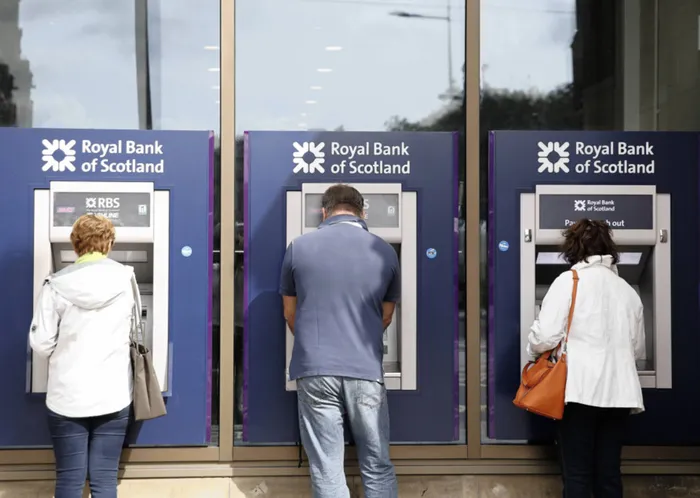Scottish banks ‘likely to move’

Royal Bank of Scotland ATMs in Edinburgh. The Scottish lender and Lloyds are likely to relocate to London, regardless of how Scotland votes next week, analysts say. Photo: Bloomberg Royal Bank of Scotland ATMs in Edinburgh. The Scottish lender and Lloyds are likely to relocate to London, regardless of how Scotland votes next week, analysts say. Photo: Bloomberg
London - Bank of Montreal is now based 480km away in Toronto after bolting amid the rise of Quebec separatism. Royal Bank of Scotland (RBS) and Lloyds may make the same decision to leave Edinburgh, no matter how Scotland votes next week.
Rather than risk perpetual uncertainty over Scotland’s future, “the banks would want to kick off the relocation process irrespective of the decision”, Chirantan Barua, an analyst at Sanford C Bernstein, said yesterday. The risk had become “irreversible”, though a move would cost each bank £1 billion (R17.6bn), he estimated.
RBS and Lloyds, which both received a government bailout in 2008, are the two biggest lenders in Scotland. Lloyds said on Wednesday that it already had a contingency plan for establishing new legal entities in England in the event of a vote for independence, while RBS said that such an outcome would make it necessary to redomicile the headquarters.
“The issue could come back in future, so it’s entirely conceivable that you’ll see the banks switching their registration to England,” even if there was a “no” vote, Investec analyst Ian Gordon said.
RBS shares rose 2.3 percent to £3.50 at 8.16am in London yesterday, while Lloyds added 1.1 percent to 74p.
RBS, whose Scottish roots date back to 1727, said there were “a number of material uncertainties arising” from the referendum, which could affect its credit ratings as well as the “fiscal, monetary, legal and regulatory landscape to which it’s subject”.
“For this reason, RBS has undertaken contingency planning for the possible business implications for a ‘yes’ vote,” it said. “In the event of a ‘yes’ vote, the decision to redomicile should have no impact on everyday banking services.”
Lloyds said it had seen an “increased level of enquiries” from customers about contingency plans, adding that there would be enough time to “take necessary action” should voters say yes to independence.
Standard Life, Scotland’s largest insurer, has also made contingency plans to move parts of its business to England to reassure customers and provide them with continuity.
One in eight people in the Scottish capital work in finance. RBS has a £350 million campus near Edinburgh with capacity for 3 250 staff. Characteristic of its dual identity, the headquarters has two ATMs for staff: one that dispenses Bank of England notes and one stocked with their Scottish counterparts. RBS employs 12 000 people in the country, while Lloyds has 16 000 staff.
Shares in RBS, 80 percent-owned by the British government, and Lloyds have fallen since a weekend poll showed the “yes” vote leading for the first time in next Thursday’s referendum, as uncertainties were reignited about customers withdrawing deposits, Scotland’s future currency and the lack of a central bank.
If the country voted “no”, its banks and businesses would face a similar situation to Quebec where the independence movement was defeated in 1980 and 1995, Paul Donovan, an economist at UBS, said.
“Certainly the banks relocating from Scotland is a real possibility in a Quebecois scenario” of multiple referendums, he said. “If you look at Quebec, bank deposits never recovered – if people wanted a bank account they didn’t even consider opening one there, they’d open it over the border instead.” – Bloomberg